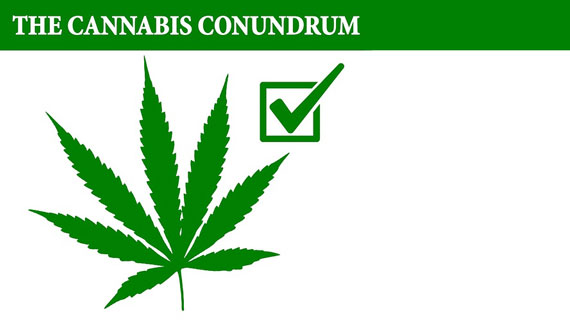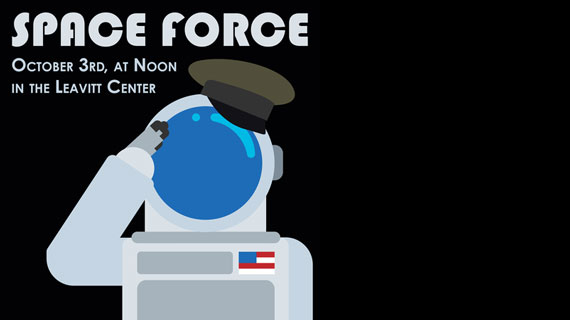Pizza and Politics Focuses on Legalizing Marijuana
Posted: March 08, 2018 | Author: Cami Mathews | Read Time: 4 minutes
 The Michael O. Leavitt Center for Politics and Public Service hosts Pizza & Politics every Wednesday at noon to discuss a current political topic. Leavitt Center student employees research the topic and moderate the conversation. These discussions expose students to a variety of important issues and encourages them to share their own perspectives while learning all sides of an issue. Free pizza is provided for all who attend.
The Michael O. Leavitt Center for Politics and Public Service hosts Pizza & Politics every Wednesday at noon to discuss a current political topic. Leavitt Center student employees research the topic and moderate the conversation. These discussions expose students to a variety of important issues and encourages them to share their own perspectives while learning all sides of an issue. Free pizza is provided for all who attend.
From edibles to oil pills, the discussion on legalizing marijuana covered it all. Moderators for the afternoon were Ryan Robinson, senior political science major from Parowan, Utah, and Ayleen Perry, senior English major from Las Vegas, Nevada.
According to NORML.com, decriminalization of marijuana has occurred in 14 states, including Nebraska and West Virginia. The drug has been deemed legal in nine states, including Alaska and Maine. The bulk of the conversation surrounding marijuana can be broken down into three categories: everything is legal, only medical use is legal, or everything is illegal.
The moderators started the conversation by gauging the thoughts of the room. When asked if marijuana should be legal across the board, all but one person raised their hands. It was an uphill battle for those in favor or limited legalization, but many let their voices be heard.
Should marijuana be under federal or state jurisdiction?
By now, one can understand that the majority of conservatives feel the federal government controls enough. Many voices in the room felt that the marijuana argument could be left to state powers. The opposite side thought it would be easier to create a blanket law over the country, limiting confusion when marijuana crosses state lines.
Pros and cons of legalizing marijuana?
Those who favor legalizing marijuana stated it can help with medical problems, including chronic pain. The drug can prevent nausea caused by chemotherapy, help HIV patients regain appetite, reduce seizures associated with epilepsy, and alleviate tremors, muscle spasms, and pain of multiple sclerosis.
Some of the negative effects of marijuana include impairments of problem-solving skills, memory, and balance, structural changes in the brain, risk of heart attack, potentially addictive which can lead to harder drug use, weak respiratory systems, and comprise of immune systems. All people agreed that smoking anything will hurt the lungs, but no one knew of any deaths directly related to marijuana use.
In which forms should marijuana be legal?
There are many forms of marijuana available to people. Those forms include vapor, edibles, ingestible oils, tinctures, topicals, and dabbing. Tinctures are infused liquids that extract cannabis compounds using an alcohol soak and are applied directly under the tongue. Topicals are cannabis-infused lotions and balms that are applied directly to the skin for localized relief of pain, soreness, and inflammation. Dabbing is a method of flash-vaporization in which cannabis concentrates are dropped on a heater water-pipe attachment and inhaled for intensely potent effects.
Though a majority of people want legalization of marijuana, only a few said it should be legal in all forms. Many felt that smoking was similar to cigarettes, where it not only harms the body but has second-hand effects. A bulk of the comments leaned towards oil pills and other forms of the drug that would have the medical benefits of the plant without the psychedelic effects.
If marijuana is legalized, what happens to the current population in custody due to possession of marijuana?
Over 7 million people were busted for marijuana possession from 2001 to 2010. In 2010 alone, police made one arrest every 37 seconds. Ninety percent of people in jail are there due to nonviolent drug crimes. Sixty percent of those people were arrested due to possession of marijuana. It should be noted that the money to run and operate jail comes from tax dollars.
The room was split with this question. Many had the idea that if marijuana were to become legal in a state, then all who were in jail should be released because they no longer committed a crime. Others did not care what the law will be, but focused on what the law was. If a person broke the law in 2010, but in 2020 the law changed, it should not matter because the law was different back when it was broken.
What should be the process in order to sell marijuana?
The process to sell the drug is different in the states where it is legal to use. In Oregon, licenses are required and available for both medical and recreational marijuana businesses. Separate licensing and registration is required for growers and dispensary operators. The Oregon Liquor Control commission License (OLCC) accepts applications for recreational licenses.
The Nevada Department of Taxation covers licensing and regulation for retail marijuana businesses. It also covers the state’s medical marijuana program. Until November 2018, only existing medical marijuana establishment certificate holders can apply for a retail marijuana establishment license.
Opinions on the matter thought that at the lowest level, marijuana vendors need to obtain a business license and follow those regulations. However, many felt that drugs should need to come from medical professionals, so obtaining a medical license would be necessary as well. Not many people knew the specifics of business or medical licenses, so the question did not go into further detail.
Overall, the campus community in attendance at Pizza & Politics wanted marijuana to be legal. Maybe it was the overwhelming presence of stressed-out college students, or a large understanding of the medical benefits that the drug can provide.
This article was published more than 3 years ago and might contain outdated information or broken links. As a result, its accuracy cannot be guaranteed.
Tags: Student Blog Leavitt Center


